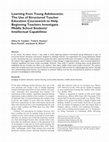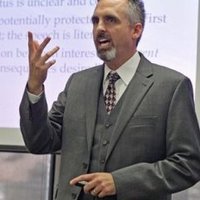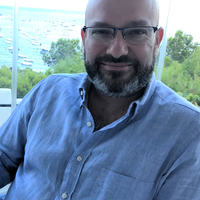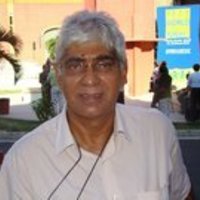Peer-Reviewed Journal Articles by Jason Ritter

Action in Teacher Education, 2012
Over a 7-year period, graduate teaching assistants participated in a teacher education doctoral s... more Over a 7-year period, graduate teaching assistants participated in a teacher education doctoral seminar designed to develop emergent scholarship and practice in teacher education. Six former students in the seminar, all now assistant professors, joined Dinkelman in an open-ended, far-ranging, month-long conversation captured in a threaded, online discussion forum. The study unfolded as a collaborative self-study that made use of this forum and subsequent analyses to address two central research questions: (1) What influence might our seminar have had on your development as an emerging scholar? and (2) What influence might our seminar have had on your development as a teacher educator? In this article, we reflect on how participation in the seminar shaped the emergence of new scholars and teacher educators, as doctoral students and also as new faculty members. Findings suggested the seminar facilitated emergent scholarship by helping participants map the terrain of teacher education research, prompting actual research, and blurring the knower and known in studying teacher education. The seminar also helped develop emergent teacher educators practice through helping participants learn a language for teacher education, develop a sense of program, value collaboration, and define purpose and care for the practice of teacher education. The concluding discussion emphasizes the need for additional inquiry into the ways early-career teacher educators develop commitments to teacher education research and practice.
Teacher Education Quarterly, 2011
Social Studies Research & Practice, 2007
This paper reports on the processes and outcomes of a collaborative self-study conducted by three... more This paper reports on the processes and outcomes of a collaborative self-study conducted by three beginning teacher educators who sought to examine the efficacy of their teaching practices while working with student teachers in the field. By systematically embracing opportunities to explore mutually pressing issues and concerns manifest across the student teaching semester, the authors found that collaborative self-study provided a useful framework for considering their pedagogical reasoning and decision making as they encouraged student teachers to engage in rationale-based practice. The understandings gleaned from this study provided the authors with a basis upon which to reexamine their developing teacher educator pedagogies, as well as to critique the nature and structure of their teacher education program.

Over a 7-year period, graduate teaching assistants participated in a teacher education doctoral s... more Over a 7-year period, graduate teaching assistants participated in a teacher education doctoral seminar designed to develop emergent scholarship and practice in teacher education. Six former students in the seminar, all now assistant professors, joined Dinkelman in an open-ended, far-ranging, month-long conversation captured in a threaded, online discussion forum. The study unfolded as a collaborative self-study that made use of this forum and subsequent analyses to address two central research questions: (1) What influence might our seminar have had on your development as an emerging scholar? and (2) What influence might our seminar have had on your development as a teacher educator? In this article, we reflect on how participation in the seminar shaped the emergence of new scholars and teacher educators, as doctoral students and also as new faculty members. Findings suggested the seminar facilitated emergent scholarship by helping participants map the terrain of teacher education research, prompting actual research, and blurring the knower and known in studying teacher education. The seminar also helped develop emergent teacher educators practice through helping participants learn a language for teacher education, develop a sense of program, value collaboration, and define purpose and care for the practice of teacher education. The concluding discussion emphasizes the need for additional inquiry into the ways early-career teacher educators develop commitments to teacher education research and practice.

Journal of Teacher Education, 2010
In this article, the authors discuss a case study in which beginning teachers interviewed young a... more In this article, the authors discuss a case study in which beginning teachers interviewed young adolescents as part of structured teacher education coursework designed to challenge teachers’ low expectations for young adolescents. Based on pre- and post surveys, pre– and post–focus group interviews, classroom field notes, and teachers’ written analysis papers, the authors’ data suggest that the coursework helped to shape changes in beginning teachers’ views of young adolescents’ analytical capabilities and social studies knowledge. However, these shifts in teachers’ thinking about young adolescents’ capabilities did not translate into shifts in the teachers’ ideas about middle school social studies instruction. The authors argue that carefully structured coursework like this interview project holds promise for helping beginning teachers develop new understandings about learners, but attention to students’ abilities must also be accompanied by attention to teachers’ purposes and pedagogical understandings.
Papers by Jason Ritter
Issues in Teacher Education, Nov 1, 2014
This paper reports on the question of what happens when someone who has become almost fully ingra... more This paper reports on the question of what happens when someone who has become almost fully ingrained in the world of teacher education returns full-time to teach high school social studies. Using oral narrative methodology, findings describe the unanticipated challenges the participant encountered during his re-entry period to the classroom. The implications of this study suggest a need for increased attention to be placed on how teachers and teacher educators of mainstream cultures might best obtain the cultural sensitivity and practical experiences needed to engage diverse learners in meaningful learning.
EdMedia: World Conference on Educational Media and Technology, Jun 29, 2010
Studying Teacher Education, Sep 25, 2012
The New Educator, Oct 1, 2013
ABSTRACT Inquiry-based and interdisciplinary teaching practices exemplify constructivist approach... more ABSTRACT Inquiry-based and interdisciplinary teaching practices exemplify constructivist approaches to education capable of facilitating authentic student learning; however, their implementation has proven particularly challenging within certain contexts in the United States. This qualitative study considers one such context via an investigation of elementary teachers' views on teaching inquiry-based, interdisciplinary science and social studies in urban settings. Interview data from 15 teachers in three urban schools are presented. Findings describe how teachers' views compare to the respective national standards in each curricular area and detail the barriers they report to implementing such practices in their classrooms.

Journal of Teacher Education, Sep 1, 2010
In this article, the authors discuss a case study in which beginning teachers interviewed young a... more In this article, the authors discuss a case study in which beginning teachers interviewed young adolescents as part of structured teacher education coursework designed to challenge teachers’ low expectations for young adolescents. Based on pre- and postsurveys, pre— and post—focus group interviews, classroom field notes, and teachers’ written analysis papers, the authors’ data suggest that the coursework helped to shape changes in beginning teachers’ views of young adolescents’ analytical capabilities and social studies knowledge. However, these shifts in teachers’ thinking about young adolescents’ capabilities did not translate into shifts in the teachers’ ideas about middle school social studies instruction. The authors argue that carefully structured coursework like this interview project holds promise for helping beginning teachers develop new understandings about learners, but attention to students’ abilities must also be accompanied by attention to teachers’ purposes and pedagogical understandings.
The social studies, May 1, 2012
ABSTRACT This article reports on the practice of a teacher educator in an elementary social studi... more ABSTRACT This article reports on the practice of a teacher educator in an elementary social studies, teacher education course while he attempts to promote a view of powerful social studies teaching and learning through modeling powerful social studies lessons and publicly sharing his thinking about the lessons as they unfolded. Findings from this self-study of practice describe the challenges and highlight the potential of using modeling in teacher education as an intellectual and pedagogical method to facilitate preservice teachers’ learning about teaching social studies.
Social studies research & practice, Nov 1, 2007
This paper reports on the processes and outcomes of a collaborative self-study conducted by three... more This paper reports on the processes and outcomes of a collaborative self-study conducted by three beginning teacher educators who sought to examine the efficacy of their teaching practices while working with student teachers in the field. By systematically embracing opportunities to explore mutually pressing issues and concerns manifest across the student teaching semester, the authors found that collaborative self-study provided a useful framework for considering their pedagogical reasoning and decision making as they encouraged student teachers to engage in rationale-based practice. The understandings gleaned from this study provided the authors with a basis upon which to reexamine their developing teacher educator pedagogies, as well as to critique the nature and structure of their teacher education program.

Advances in research on teaching, Oct 29, 2020
The educational self is a construct derived from cultural psychology that attempts to account for... more The educational self is a construct derived from cultural psychology that attempts to account for the role of educational experiences in the construction and elaboration of the self. It conceptualizes of self as a semiotic process that is both dialogical and polyphonic from its origin, yet grounded in some historically and culturally derived shared meanings and practices. The purpose of this chapter is to situate discussion of the educational self in the context of the United States and to explore its implications for teaching, teacher education, and self-study of practice via an examination of the life trajectory of the author that is both retrospective and introspective. An argument is put forward that examining the educational self represents a promising starting point for understanding and studying one's own teaching or teacher education practices.
Social studies research & practice, Nov 1, 2013
This qualitative inquiry reports the ways in which three graduate-level preservice elementary tea... more This qualitative inquiry reports the ways in which three graduate-level preservice elementary teachers conceived of the relationship between diversity and democracy, and explores how their understandings of this relationship informed their planning for democratic citizenship education with young learners. Findings indicate while the participants exhibited a certain measure of variance in their thinking about diversity and democracy, all of them planned their lessons at a lower level of multicultural support than their views suggested they would. This primarily highlights the ongoing lack of understanding regarding what it might mean to teach democratic citizenship through its practice as well as its study.
Springer eBooks, 2010
The progressive educational philosophy of John Dewey (1916/2004, 1938/1997) focused on the import... more The progressive educational philosophy of John Dewey (1916/2004, 1938/1997) focused on the importance of educating students for life in democratic society. Because Dewey theorized that education and society were interactive and interdependent, he stressed that schooling must be understood as “a process of living and not a preparation for future living” (Dewey, 1897/2006, p. 24). For this reason his philosophy
At a large public university in the south eastern United States, prospective middle and high scho... more At a large public university in the south eastern United States, prospective middle and high school social studies teachers complete a four semester undergraduate program that prepares them for the classrooms of America. Like many programs, this one begins with an introductory course that provides students an opportunity to explore questions about the nature, purpose, and practices of social studies in the modern school curriculum. As a part of this course, students also develop a rationale for teaching social studies which is used as a part of admission into the Social Studies Education program. Once they have been admitted to the program, students typically complete one or more semesters of discipline specific courses prior to their final two semesters at the institution.
Issues in Teacher Education, Oct 1, 2014











Uploads
Peer-Reviewed Journal Articles by Jason Ritter
Papers by Jason Ritter